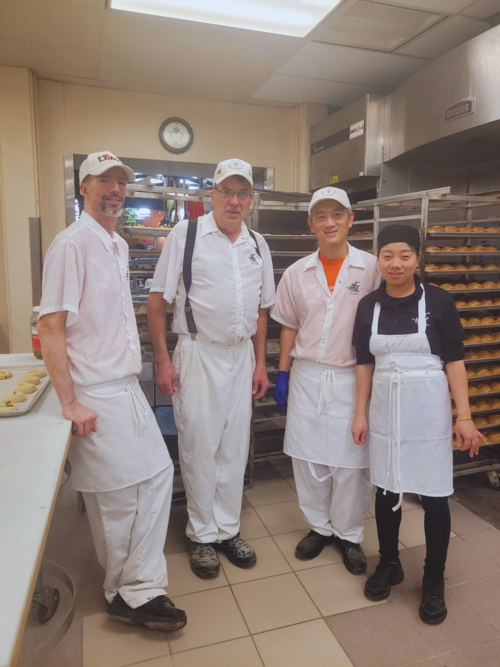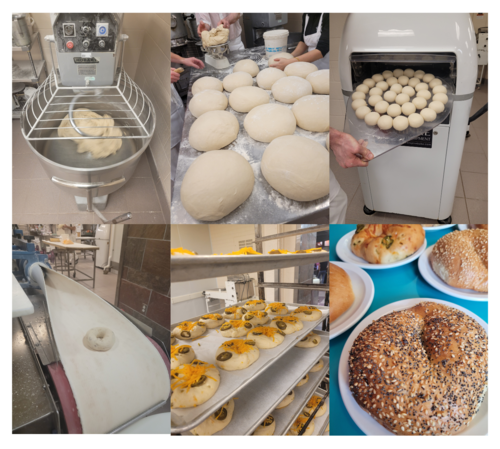Written by: Monika Terzic
A common breakfast item that continues to produce smiles on student’s faces despite its simplicity—the bagel. Bagels are made from the basic bread ingredients of flour, yeast, salt, and sweetening such as liquid malt, which is what head baker Paul Gatcke has been using to make his bagels for 10 years since bagel production began at the Village Bakery here at the University of Waterloo. Bagel production is a process that requires many steps from proofing, shaping, seeding, steaming and baking with numerous controls at each stage to create these bakery-fresh favourites on the UWaterloo campus daily.
“There’s always a high demand for our bagels. We make about 24 dozen bagels every day—that’s nearly 300 bagels!” (Paul Gatcke, Head Baker)
The Village Bakery prepares freshly baked bagels for several locations across campus everyday including Browser’s Café in Dana Porter Library, Ev3rgreen Café in EV3, Liquid Assets Café in Hagey Hall, CEIT Café in the Earth Sciences building, and ML’s Diner among others. Gatcke recalls Brubaker’s Kitchen Bagel Bar as being the most in demand campus location for these tasty rolls. Situated in the Student Life Centre (SLC), Brubaker’s Kitchen serves up bakery-fresh bagels that are toasted and then topped with cream cheese, lox (smoked salmon), red onions, capers, and fresh dill along with other topping combinations like blueberry compote, brie cheese and chopped basil. One student revealed that the lox bagel at Brubaker's is not only a student-favourite, but her personal favourite place to eat on campus stating that, “The bagels at SLC are the best!! The lox bagel is legit”. The customizations are endless and so, one might wonder about the origins of such a flexible breakfast brunch staple.
Back in Time with a Bagel
Did you know that in the 1600s bagels were thought of as more than just a tasty treat? In Medieval Poland, the round shape of the bagel was believed to bring good luck in childbirth and symbolised long life. The first ever bagel is said to have been created by a Viennese baker who wanted to honour Polish King John III Sobieski who saved Vienna by drawing back Turkish invaders. As a symbol of King John’s skill as a horseman, the baker formed some dough into a ring, supposedly resembling a stirrup and surprisingly enough, the Austrian word for a ‘stirrup’ is beugel. Somewhere along the lines, we ended up with the modern day bagel, popularised across University and College campuses all over the globe!
 Our Past
Our Past
While bagel history 101 is interesting and all, The Village Bakery’s history is even more rich. The campus Bakery first opened in 1998 with Head Baker Paul Gatcke stepping into the scene with his right hand man, Nate Novenski, Assistant Baker. The pair have worked together for just shy of 25 years, witnessing many changes along the way. It wasn’t until 2013 that bagel production first began following building renovations.
Originally, bagels were made using a wood fired pizza oven until Food Services invested in their first steam oven. This ensured perfect consistency and allowed the bake shop team to produce bagels in a fraction of the time. Just 10 years later, the bake shop team is producing in-house bagels daily for the UW community to enjoy!
The Power in Flour: How Bagels are Made!
Baking is an art that requires precision, technique, timing and teamwork. The magic begins when yeast is mixed with water and high gluten flour. The flour is enriched with ascorbic acid, enzymes, and other nutrients, like iron, folic acid, niacin, thiamin, and riboflavin that were removed during the milling process. High protein flour doughs are physically stronger, more stable and require more water and a longer mixing time to ensure consistency and optimal dough development. Containing 13%-15% of protein, high gluten flour gives the Village’s bagels their signature stretchy and chewy texture. Once the dough is kneaded in a large industrial mixer, toppings like freshly chopped jalapenos, cheese, and multigrain mix-ins are slowly added in separate spiral mixers. Then, the dough is weighed and divided into eight-pound “heads” using an Empire Rounding machine and left to rest.
 In modern day bagel production, the dough rings that form the bagel are machine-made. It takes a four-person team to roll, cut, and feed the bagels into the Empire Bagel machine for shaping—this is a long machine that has a flexible belt that runs its length. At one end, someone feeds the dough into an opening, while at the other end, small dough rings rapidly emerge as they are scooped up and dipped into cold water to begin the seeding process. When asked what the challenges of bagel production are at the bake shop Gatcke expressed that the main challenge of bagel production is its fast-paced production environment.
In modern day bagel production, the dough rings that form the bagel are machine-made. It takes a four-person team to roll, cut, and feed the bagels into the Empire Bagel machine for shaping—this is a long machine that has a flexible belt that runs its length. At one end, someone feeds the dough into an opening, while at the other end, small dough rings rapidly emerge as they are scooped up and dipped into cold water to begin the seeding process. When asked what the challenges of bagel production are at the bake shop Gatcke expressed that the main challenge of bagel production is its fast-paced production environment.
“Keeping up is definitely a challenge,” he says. “When turning out so much product, our team has to be able to keep up with the speed of the whole process. On the bright side, water and flour are cheap ingredients that pay off in the long run and are a good money maker”.
A blend of poppy seeds, sesame seeds, and dried onions are evenly spread by hand over the tops of everything bagels—one of five flavours offered at the bake shop. The water helps toppings like seeds and grains stick, while heftier toppings such as cheese and chopped jalapenos are added manually on the tops of each ring. The bake shop staff is generous with their toppings, adding about a ½ pound of toppings per head, followed by steaming and baking. The result is a fresh, doughy roll that can be topped with cream cheese, butter, jam, nutella, or whatever else your heart desires!
Watch the whole process here https://www.instagram.com/p/CoXPT_xgImd/
Our Brand: Farm to Campus Fresh
Our bagels are an integral part of our Farm to Campus Fresh brand, through which we promote sustainability, nutrition and local sourcing. We own and operate the Village Bakery, which supplies our cafés and eateries with fresh daily bagels, pastries, and treats. Check out our brand values below:
- We support as many as 75 local farmers.
- We provide plant-based options in all our cafés and eateries. A dedicated plant-forward menu is available at Evergreen Café in EV3.
- Our Chef’s use fresh local ingredients to create dishes that are prepared from scratch in our kitchens.
- We support our customer’s health by promoting fresh nutritious foods to the campus community.
Read more about our brand here!
This article is dedicated to Paul Gatcke who has served UW Food Services and the Village Bakery for over 40 years and is set to retire in the Spring of 2023. Thank you for the love you put into each and every bagel, baked good and confection on our beautiful campus.





